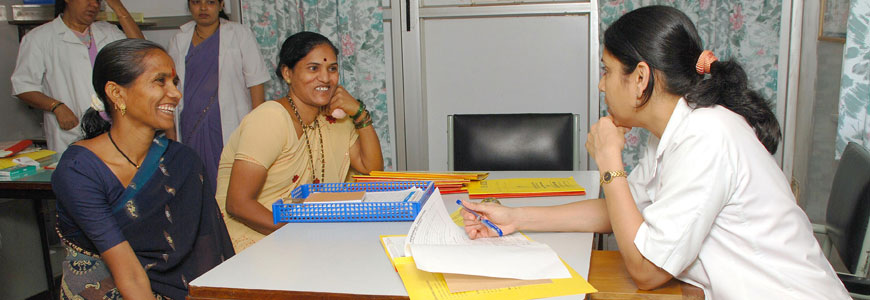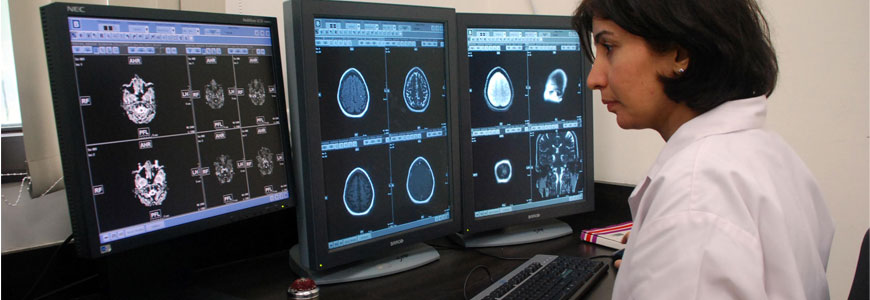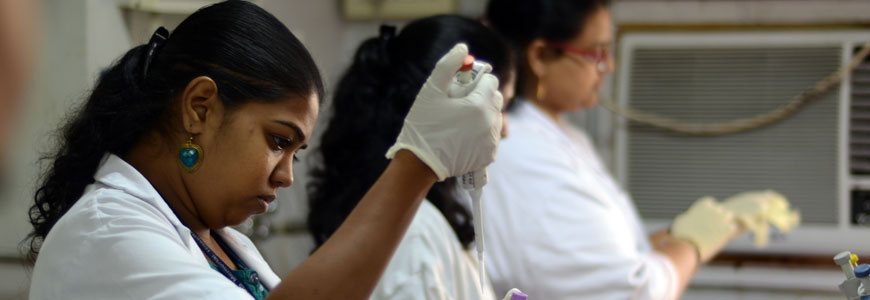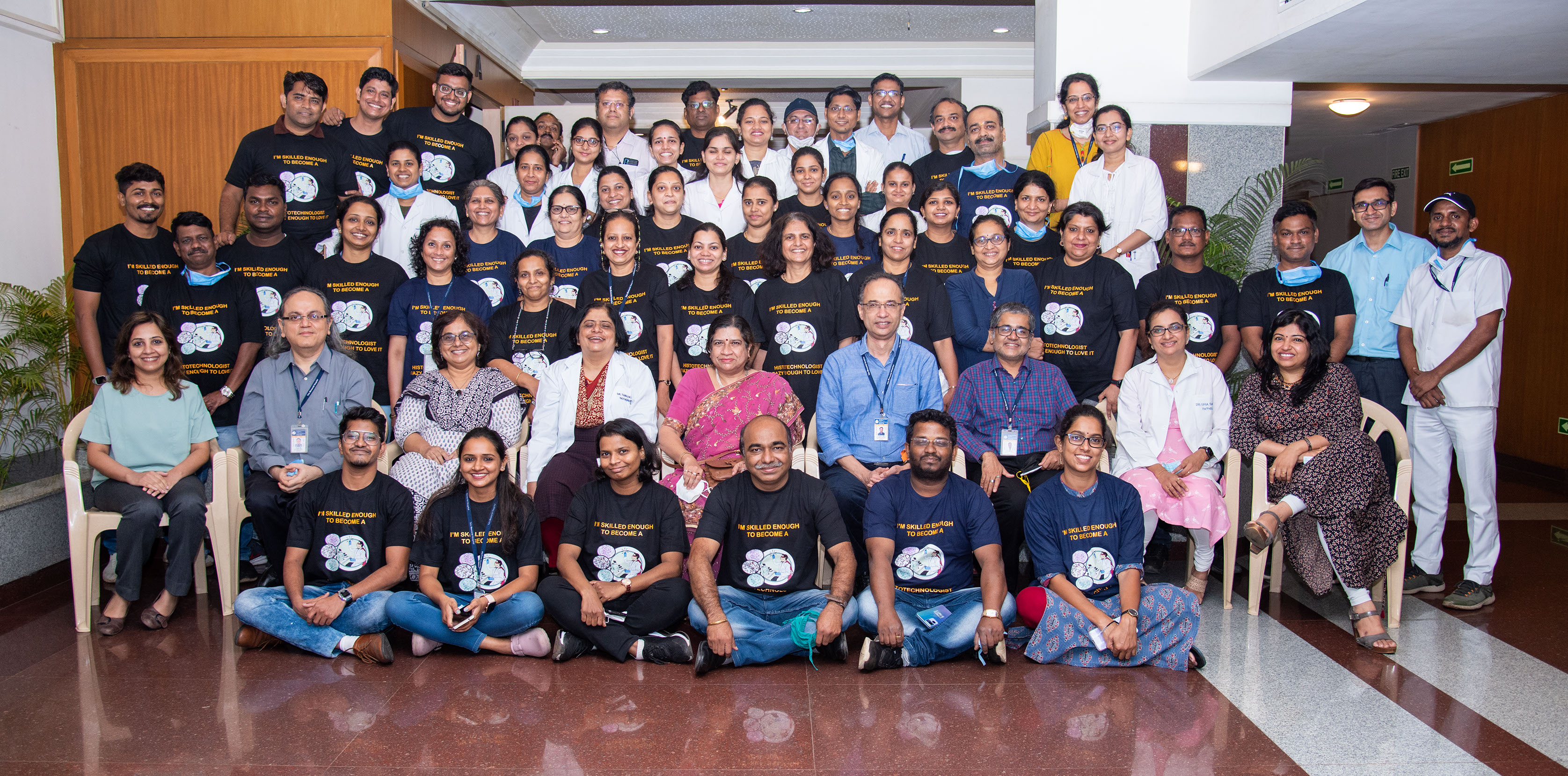 |
 |
 |
 |
 |

 The Tata Memorial Centre constitutes the national comprehensive cancer entre for the prevention, treatment and research on Cancer and is comparable to any similar center in the world. This achievement has been possible due to the far-sighted and total support of the Department of Atomic Energy, responsible for managing this Institution since 1962.
The Tata Memorial Centre constitutes the national comprehensive cancer entre for the prevention, treatment and research on Cancer and is comparable to any similar center in the world. This achievement has been possible due to the far-sighted and total support of the Department of Atomic Energy, responsible for managing this Institution since 1962.
In 1932 when Lady Meherbai Tata died of leukaemia, after treatment abroad, Sir Dorab Tata was determined to establish similar facilities for the treatment of Cancer in India, initially planned for with a Radium Institute in Bombay. Sir Dorab unfortunately died in 1932. Such was the commitment he made that the Trustees of the Sir Dorab Tata Trust, along with various outstanding Cancer specialists committed themselves in 1935 to the establishment of the centre that would benefit the Nation with a more lasting value than the usual philanthropy . Out of this humanitarian concept and commitment from the House of Tatas was born the nucleus of a Hospital, in 1941, called the TATA MEMORIAL HOSPITAL. The Tata Memorial Hospital was initially commissioned 57 years ago in 1941 with a small eighty bed Hospital. In 1952 the Indian Cancer Research Centre was established as a pioneer research institute for basic research - later called the Cancer Research Institute (CRI). In 1957 the Ministry of Health temporarily took over the Tata Memorial Hospital. The transfer of the administrative control of the Tata Memorial Centre (Tata Memorial Hospital and Cancer Research Institute) to the Department of Atomic Energy in 1962 was the next major milestone. This was due to the foresight and the vision of Dr. Homi Bhabha, who envisaged the major role that radiation would play in cancer treatment - from imaging to staging and actual therapy. The TMH and CRI merged as the two arms of the Tata Memorial Centre (TMC) in 1966 represented a classic example of private philanthropy augmented by Government support, with a mandate for Service, Education and Research in Cancer.
The Tata Memorial Hospital was initially commissioned 57 years ago in 1941 with a small eighty bed Hospital. In 1952 the Indian Cancer Research Centre was established as a pioneer research institute for basic research - later called the Cancer Research Institute (CRI). In 1957 the Ministry of Health temporarily took over the Tata Memorial Hospital. The transfer of the administrative control of the Tata Memorial Centre (Tata Memorial Hospital and Cancer Research Institute) to the Department of Atomic Energy in 1962 was the next major milestone. This was due to the foresight and the vision of Dr. Homi Bhabha, who envisaged the major role that radiation would play in cancer treatment - from imaging to staging and actual therapy. The TMH and CRI merged as the two arms of the Tata Memorial Centre (TMC) in 1966 represented a classic example of private philanthropy augmented by Government support, with a mandate for Service, Education and Research in Cancer.
It is important to remember the contributions of Dr. J.C. Paymaster, Dr. E. Borges, Dr. D. Meher-Homji , Dr. D.J. Jussawalla, Dr. V.R. Khanolkar, Dr. K.J. Randive and many others towards building this Institute. In more recent times Dr. P.B. Desai, Dr. R.S. Rao, Dr. M.G. Deo, Dr. A.N. Bhisey and Dr. K.A. Dinshaw have given impetus to the rapid progress. With the total commitment of the DAE and successive Chairmen from Dr. H. Bhabha, Dr. V. Sarabhai, Dr. H.N. Sethna, Dr. R. Ramanna, Dr. M.R. Srinivasan, Dr. P.K. Iyengar and Dr. R.C. Chidambaram the Centre has rapidly expanded its functions and activities. The current activities of the Tata Memorial Hospital and the level of eminence reached in its various spheres of expertise are worth recording. Nearly 25,000 patients visit the clinics annually not only from all over India but also from neighbouring countries. Nearly 60% of these cancer patients receive primary care at the Hospital of which over 70% are treated free of any charges. Over 1000 patients attend the OPD daily for medical advice, comprehensive care or for follow-up treatment. The Hospital has expanded from a 80 bed Hospital covering an area of 15,363 sq. meters to a 441-beds spread over 53,890 sq. meters. Our Annual Budget was Rs.5 lacs in 1941 - today it runs close to Rs.28 crores.
The current activities of the Tata Memorial Hospital and the level of eminence reached in its various spheres of expertise are worth recording. Nearly 25,000 patients visit the clinics annually not only from all over India but also from neighbouring countries. Nearly 60% of these cancer patients receive primary care at the Hospital of which over 70% are treated free of any charges. Over 1000 patients attend the OPD daily for medical advice, comprehensive care or for follow-up treatment. The Hospital has expanded from a 80 bed Hospital covering an area of 15,363 sq. meters to a 441-beds spread over 53,890 sq. meters. Our Annual Budget was Rs.5 lacs in 1941 - today it runs close to Rs.28 crores.
Nearly 15,000 minor operations, 8500 major operations and 500 laser surgeries are performed annually. About 5000 patients are treated with Radiotherapy and Chemotherapy annually in multi-disciplinary programs delivering well-established treatments.
Surgery remains the vital form of treatment along with radiation therapy and chemotherapy. Much progress has been made resulting in tremendous improvements in the overall survival of disease in many sites.
The strategies for early diagnosis, treatment management, rehabilitation, pain relief and terminal care have been established in a comprehensive and multidisiplinary approach for a total cancer care programme. Many advances have taken place in every speciality. In surgery, the changing concepts have taken into account the biology of cancer. Radical surgeries have yielded place to more conservative surgery, with the very important objective of quality of life, conserving function and organ without compromising the overall survival outcomes. This has been very clearly proven in the early stage cancer of the breast or tumours involving the soft tissue or bone, where amputative surgery has been replaced by less radical procedures. Radiation therapy has also made rapid advances with high technology, precision, computerization and newer isotopes for therapy. Chemotherapy has played a very major role, with many new drugs and clinical protocols investigated in clinical trials.
Many advances have taken place in every speciality. In surgery, the changing concepts have taken into account the biology of cancer. Radical surgeries have yielded place to more conservative surgery, with the very important objective of quality of life, conserving function and organ without compromising the overall survival outcomes. This has been very clearly proven in the early stage cancer of the breast or tumours involving the soft tissue or bone, where amputative surgery has been replaced by less radical procedures. Radiation therapy has also made rapid advances with high technology, precision, computerization and newer isotopes for therapy. Chemotherapy has played a very major role, with many new drugs and clinical protocols investigated in clinical trials.
The TMH was the first Centre in the country to initiate Bone Marrow Transplant in 1983. This has been possible due to better total supportive care using better antibiotics, nutritional, blood transfusion support, nursing and other areas.
Another important area of progress over the last few years has been radiological imaging techniques using ultrasound, CT Scanners and more dynamic real time nuclear medicine scanning.
Pathology has progressed from basic histopathology to molecular pathology with emphasis on predictive assays for identifying the high risk prognostic factors. Today, state-of-the-art equipment is available in every Department including the latest Spiral CT Scanners, Gamma Cameras, Ultrasound, Microscopes, Linear Accelerators, Simulators, Bone Marrow Transplantation facilities, ICU for critical care of patients, updated Operation Theatres, sophisticated Blood Bank facilities and laboratories. We are in a position to render high immunological, histochemical, technological level of biochemical, cytological and pathological services.
Today, state-of-the-art equipment is available in every Department including the latest Spiral CT Scanners, Gamma Cameras, Ultrasound, Microscopes, Linear Accelerators, Simulators, Bone Marrow Transplantation facilities, ICU for critical care of patients, updated Operation Theatres, sophisticated Blood Bank facilities and laboratories. We are in a position to render high immunological, histochemical, technological level of biochemical, cytological and pathological services.
Supportive care in the form of total rehabilitation, and counselling of patients is widely recognised to be very important aspects of therapy. Excellent work has been carried out in areas of Patient Rehabilitation, physiotherapy, occupational therapy, speech therapy, psychology and medical Social work.
Preventive Oncology has a very major and important role to play for early diagnosis, screening and down staging of cancer. Patient should come in earlier stages, and high risk individuals should be sensitized and made aware of signs and symptoms of cancer for early screening and examinations. Public education and community based programmes have been strengthened as an effective means of optimizing the impact of available resources. Our Programs for Cancer awareness, prevention, and control are well recognized and established with a satellite Rural Cancer Centre at Barshi. Recently, awareness campaigns highlighting the cancerous effects due to the sustained use of tobacco, banning the use of tobacco in the entire Hospital complex, targeting school and College children by educational programs highlighting the terrible effects of smoking and preventing them from even starting the habit, are some of the activities in progress in the Department of Preventive Oncology.
Our Programs for Cancer awareness, prevention, and control are well recognized and established with a satellite Rural Cancer Centre at Barshi. Recently, awareness campaigns highlighting the cancerous effects due to the sustained use of tobacco, banning the use of tobacco in the entire Hospital complex, targeting school and College children by educational programs highlighting the terrible effects of smoking and preventing them from even starting the habit, are some of the activities in progress in the Department of Preventive Oncology.
Well into the sixth decade of its existence, the Tata Memorial Hospital remains the victim of its own prestige and credibility generated over decades of hard and dedicated work. An Institution is judged by the quality of the people who form the entire work-force. Our eminence is entirely due to the unquestioned and total dedication of the entire staff in the cause of fighting cancer regardless.
The long standing prestige of the Institution needs to be fully supported to continue to deliver dependable quality care in Cancer service, research and education of the highest order.
It is a tribute to the clinical and medical excellence of our staff that our Hospital has been a Centre for multicentric research studies. Currently we have studies conducted in collaboration with NCI, USA for treatment of childhood acute lymphoblastic leukemia and non-Hodgkin's lymphoma; a collaboration with IARC, France on an epidemiological study for neoplasms of the lung and lymphatic and haemopoetic system and a large cohort study to detect early cancers in women supported by the NIH, Washington. The new Clinical Research Secretariat as a facility assists in the execution and co-ordination of all these research activities, after review and sanction by the Scientific Review Committee and the Ethics Committee. Simultaneously other international collaborations for teaching and training with WHO, UICC, and IAEA have brought recognition to the Centre, its 200 Doctors, 300 nurses and 200 Scientific Officers. At any given time nearly 150 young students, medical professionals, scientists or technicians are undergoing training and Continuing Educational Programs, which impart knowledge, skills, and consultancy on a national basis.
In line with recent advances in Information Technology, the Tata Memorial Centre has about the best comprehensive computerization of Medical Records and also improved communication by widening of the Electronic mail and Internet facilities.
With the escalation and pressures on our entire infrastructure, introduction of modern techniques of Hospital management are required to ensure the least delay and discomfort to patients. We have therefore introduced Professionals to review all our methods and systems for Total Quality Management in all areas to make our own work-force and environment more amenable for optimum performance.
The Cancer Research Institute plays an important role with understanding of the molecular basis of cancer , Cell biology, molecular epidemiology, laboratory medicine with predictive assays and molecular pathology. Advances in developmental therapeutics with drugs, with different modalities of treatment using different strategies, such as gene therapy, vaccine, biological therapy and chemo prevention are being evaluated with exciting possibilities for the future.
The Cancer Research Institute by exemplary work has many firsts to its credit due to the dedicated leadership by Dr. M.G.Deo and Dr.A.N. Bhisey. It has done pioneering research on gene therapy of Cancer and in the development of transgenic mice. Its major emphasis continues to be in cancers of the Head and Neck, aerodigestive tract, breast, cervix and leukaemia - lymphomas. It continues to aim at understanding the alteration in oncogenes, tumour suppressor genes and other growth factor genes for use as markers. Products of protein and lipid peroxidations and DNA-protein cross links have been noted to be markedly elevated in tissues of patients with leukoplakia and oral cancer indicating induction of oxidative stress by tobacco. A Western blot kit for AIDS has been developed at the CRI and its efficacy has been tested in several laboratories in the Country. The TMC will actively continue with the prime objectives of excellence in patient care, research and education. However, there are practical limitations, for growth at our present site in Parel. Major efforts are on to expand the infrastructure and facilities in Parel itself to keep up with the needs and demands of the future. We are seeking major funding for a composite package for expansion, upgradation and modernisation programme. We need to procure new state of the art equipment in all Departments and laboratories with renovation and refurbishing of the existing buildings and wards. The Professional Education Division will strengthen our training, education and academic programmes to continue our objectives of developing human resource and trained personnel for the country.
The Department of Atomic Energy is also establishing a new research centre in Navi Mumbai called the Advanced Centre for Treatment, Research and Education in Cancer (ACTREC) . To focus on specific mission oriented R&D activities in the area of cancer research this Centre was conceived and approved to be completed in the Ninth Plan with a budget outlay of 71.28 crores. The first phase of ACTREC on 60 acres of land in Owe village has already started and is expected to be commissioned by 1999.
This has been planned as a state-of-the-art reseacrch center for cancers relevant to India and South East Asia, and a deemed University for education in cancer prevention, research and treatment. There comes a time in the life history of an Institution where one needs to take a good look at the past to set guidelines for the future. In a changing world, no organization can stand still. We need to reach out in order to meet the demands of the future.
In the final analysis, an Institution is judged by the quality of the people who form part of the entire work force. Our eminence is entirely due to their unquestioned and total dedication in the cause of fighting Cancer. The Tata Memorial Centre will not rest on past achievements, splendid as they are, but will continue to give succour to our patients, offer them the best chance of cure, of life, and relief from pain in continuing tribute to the vision and dedication of those who have guided the destiny of this Institution.
Testimonials
DMG's
Convener : - Dr. Manju Sengar ( Medical Oncology)
Secretary : - Dr. Tanuja shet ( Pathology )
Convener : Dr. Amit Janu ( Radiodiagnosis )
Secretary : Dr. Nehal Khanna ( Radiation Oncology )
Convener : Dr. Nita Nair ( Surgical Oncology )
Secretary : Dr. Jyoti Bajpai ( Medical Oncology )
Convener : Dr. Avanish Saklani ( Surgical Oncology )
Secretary : Dr. Vikas Ostwal ( Medical Oncology )
Convener : Dr. Kedar Deodhar ( Pathology )
Secretary : Dr. Shylasree Surappa (Gynaec Oncology)
Convener: Dr. Sarbani Ghosh Laskar (Radiation Oncology)
Secretary: Dr. Asawari Patil ( Pathology )
Convenor: Dr. Prakash Shetty ( Surgical Oncology )
Secretary: Dr. Girish Chinnaswamy ( Medical Oncology )
Convener : Dr. Chetan Dhamne (Pediatric Medical Oncology )
Secretary : Dr. Prashant Tembhare (Aemato Pathology)
Convener : Dr. Maya Prasad ( Medical Oncology )
Secretary : Dr. Mukta Ramadwar ( Pathology )
Convener : Dr. Sabita Jiwnani ( Surgical Oncology )
Secretary : Dr. Naveen Mummudi ( Radiation Oncology )
Convener : Dr. Vedang Murthy ( Radiation Oncology )
Secretary : Dr. Santosh Menon ( Pathology )
Education
Global Navigation
Contact Us
TATA MEMORIAL HOSPITAL
Dr. E Borges Road, Parel, Mumbai - 400 012 India
Phone: +91-22- 24177000, 24177300, 69537300
Fax: +91-22-24146937
E-mail : msoffice@tmc.gov.in(for patient care and queries)/cash@tmc.gov.in(for accounts related)/fundraising@tmc.gov.in (for donors and donation related)/registrar@tmc.gov.in(for education and training)/hrd@tmc.gov.in(for administrative - HRD matters)









